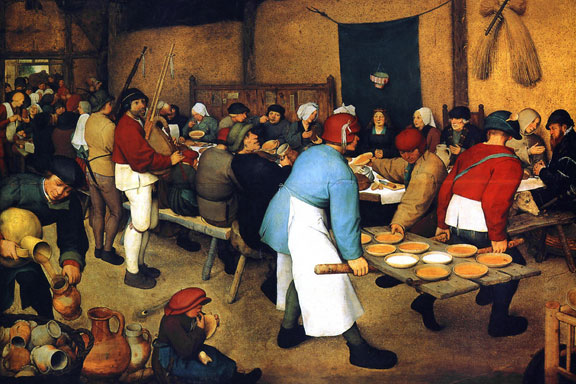The Parables of Christ Part X: Parable of the Great Feast

by Fr. James B. Buckley, FSSP
From the September 2011 Newsletter
Some exegetes claim that the parable of the Marriage of the King’s Son (Matt. 22:1–14) is the same as the parable of the Great Supper (Luke 14:16–24), but the overwhelming majority of scholars deny it. The similarity between the two is that those who were first invited refused the invitation and their places were taken by strangers from the highways.
The differences, however, set them apart. In Luke’s parable the one who invites the guests to his supper is not a king and the guests who refuse the invitation do not abuse the messengers. Unlike Matthew’s parable where the king burns the city of the rebels who maltreated and killed his delegates, the only retribution given in Luke’s parable is that “none of those that were invited will taste of my supper” (Luke 14:24). Moreover, it is only in Matthew’s parable that the king orders the guest who entered the banquet hall without a wedding garment to be bound hand and foot and thrown into the outer darkness.
The parable of the Marriage of the King’s Son presents two difficulties. First of all, why would those invited to the wedding feast injure and even kill the messenger? Secondly, how could a stranger suddenly invited to a wedding feast be justly punished for not wearing a wedding garment?
In answering the first question, Fr. Leopold Fonck, S.J. explains that accepting such an invitation signified loyalty to the king. It is, consequently, true to life that those who had planned a revolt would express their dissatisfaction with the king by maltreating his messengers.
As to the second, the man, by not answering the king’s question, indicates his guilt (Matt. 22:12). This, says Father Fonck, “proves that the prince had given those strangers who had come from the highways time and opportunity to garb themselves suitably for the royal feast (Parables of the Gospel, p. 368).
The parable, which is divided into two parts, illustrates in its first part that the Jews who had spurned the divine invitation were rejected in favor of the Gentiles. In the second part it demonstrates that the condition of holiness is necessary for entrance into eternal life.
The wedding feast which the king prepared for his son and the son’s bride is an image of the everlasting happiness that the eternal Father has prepared for the members of the Church, the Mystical Bride of His Son, Our Lord Jesus Christ. Those invited first were the Jews who imprisoned the Apostle Peter, five times scourged the Apostle Paul, and killed both John the Baptist and James the Greater. As a punishment for their outrageous rebellion, the city of Jerusalem in a.d. 70 was destroyed by the Romans, fulfilling the prophesy of Christ.
In the second part of the parable, which corresponds with the call of the Gentile peoples, the king’s servants are ordered to invite whomever they shall find at the crossroads, bad as well as good. Saint Augustine observed that the first invited who excused themselves from the feast were bad, but in this second group only those who wear the wedding garment are good. The wedding garment, he says, is charity, and it belongs to those who do not seek their own but rather the things of Jesus Christ.
Because none of those invited in the first part were found worthy, and only one of those invited in the second part was found unworthy, Father A. Jones believes that the remark “many are called but few are chosen” (Matt. 22:17) refers to the whole parable but not to either of its parts (c.f. A Catholic Commentary on Holy Scripture, p. 891). “The majority of the (Jewish) people,” he writes, “by their own fault, are deprived of salvation, but a remnant of Israel will yet share therein” (c.f. Romans 11:25). In his commentary the renowned Fr. Cornelius A. Lapide, S.J. observes that both faith and charity are necessary for salvation. The Jews who rejected Christ lacked faith, without which “it is impossible to please God,” but although the man without the wedding garment had faith, he lacked charity and so was cast into the outer darkness.
September 5, 2011








